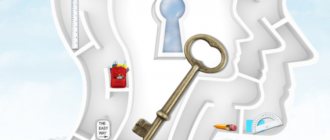Life is multi-layered and complex. This is especially well understood in the practice of relationships. Today we will look at them through the prism of transactional analysis by Eric Berne.
Emotional states are unstable, replacing each other suddenly so that sometimes control over the situation is completely lost. In order for people to understand each other, sometimes they have to give up their own interests, plans and moods in order to be able to help a person cope with his emotions. Do you understand how important we all are to each other?
We can see a friend's situation more broadly than he himself. And he, accordingly, can see our mistakes or shortcomings, helping us with his opinion to improve and look at the situation from the other side. The difference between your own perception and your opponent’s view of the same is fundamentally different.
Transactional analysis
Eric Berne analyzed communication by breaking it down into "units of communication" or "transactions" .
Hence the name of the method – transactional analysis. The theory provides answers to questions that determine the quality of our communication [2]:
- What are our ego states?
- What ego states do we carry with us throughout our lives?
- How to remove “garbage” from our heads, what should we focus on in communication?
- How do our states manifest themselves in different situations and behavior patterns?
- How can we “balance” our ego states so that they work for creation?
The subject of transactional analysis in psychotherapy is the study of ego states - integral systems of ideas and feelings that manifest themselves in our communication through appropriate behavior patterns. Using “units of interaction” - transactions, we can represent the most complex language of human relationships in the language of interactions of three basic ego states. Even a person far from psychotherapeutic practice can learn to understand the language of our ego. Speaking this language means mastering the art of communication to perfection.
Attitude to the world and to oneself according to transactional analysis
A conflict arises where the direct stimulus is directed from Adult to Adult (“Where is the report for today?”), and the reaction comes from the ego state of the Child (“Again, it’s all my fault!”). In this case, we see the so-called “ cross transaction ”, which is usually the beginning of a scandal.
But there is also a variant of “ hidden transactions ”, in which something specific is said, but something completely different is meant. At the same time, gestures, facial expressions and tone of voice often do not coincide with what the person is saying.
3 810
Ego states
For many of us, morning is a familiar sequence of actions: bathroom - breakfast - going to work. Each of them is accomplished without hesitation, “on autopilot.” At such moments we are in a state of self-controlling “Parent”.
On the way, we relax, unreasonably enjoy our mood, the sun and birdsong, the freshness of the invigorating air and a great morning - we allow our inner “Child” to manifest itself.
Suddenly, the metro, which we usually take to get to the office, is closed. We are forced to solve a specific problem - choose a path: take buses, catch a taxi or work at home. We switch from the state of “parental autopilot” to “manual control”, transferring the initiative to the “Adult”.
In just a few minutes, on the way to the office, we visited different states of the ego - our “I”.
At every moment of life, our feelings, thoughts, words, reactions and actions are determined by one of three possible ego states:
- I am a Parent
- I'm an Adult
- I am a child
Transactional analysis by Eric Berne is a ready-made set of tools for analyzing the states of our Self. Each of us can learn to use them without plunging into the jungle of the unconscious.
Carefully observe mom/dad for about 10 minutes. Notice how at least two ego states appear. She had just taught her daughter from the position of “Parent,” and in a split second she reacted to her husband’s remark from the position of “Child.” And after a few minutes, having thought, she spoke to him as an “Adult”.
Changes in ego states can and do occur quickly and frequently , and from time to time all states or two out of three appear simultaneously.
Afterword
What is the difference between a constructive business conflict and a destructive one? In constructive, people discuss contradictions and try to understand the opposite side for the sake of a common solution and clarification of the truth. In a destructive argument, people try to defend their point of view and win. But is it possible to win? Are there any winners in a broken family, a layoff, or a fight? No. Each side will feel sorry for itself and consider itself betrayed.
The inability to psychologically competently resolve conflicts and be flexible in roles leads to relationships becoming chronically emotionally tense. As a result, they either fall apart, or the participants develop psychosomatic illnesses and neuroses. Berne's theory is a useful basis for studying the problem of conflicts (in the family, at work, in any interpersonal interaction) and their resolution.
I am a Parent
In the “I-Parent” state, a person copies parental patterns of behavior or images of authorities . Feels, thinks, conducts a conversation and reacts to what is happening in the same way as his parents did in his childhood.
According to Berne, the controlling state of the “Parent” performs the function of conscience and influences a person even in those moments when his external behavior is determined by the states of the Adult or the Child. Often, the “Parent” state is used as a model when raising one’s own children. Therefore, a new parent, as a rule, behaves in the same way as his parents behaved with him. If he was scolded for breaking plates, he will soon begin to scold his children. He will have this reaction automatically; he needs to learn to stop himself and turn on his inner Adult.
"Parent" manifests itself in our ability to do things automatically, in common phrases and in manners. He likes to state: “It is impossible,” “It is necessary,” “It must be.”
What happens if the “I-Parent” ego becomes dominant over the years?
A person whose state is strictly dominated by the ego-parent easily goes to the other extreme: he tries to control the situation everywhere and always. In case of failure, he reproaches and nags himself for any reason, in everything that happens to him, he looks for and finds his guilt.
If such a scenario prevails for years and decades, it becomes the cause of psychosomatic disorders. In this case, the “I-Parent” state manifests itself as destructive and proceeds with serious consequences . As long as the parent exists, the individual will not be able to escape from his controlling influence at the level of parental programs-instructions laid down in childhood. The only way to break out of the shackles is to rewrite the outdated parent programs.
Controlling and Caring Parent
A caring Parent - "living" in you or in others - is one of the happiest states that a person can manifest and experience. He is able to help by forgiving your grievances and imperfections. He finds pleasure in this, so such help will always be on time and is perceived naturally, without tension. All that a Caring Parent requires in return is a little attention to his person.
- I am the Controlling Parent
The Controlling Parent always and everywhere strives to “knock out the wedge with the wedge.” A person in this state will again and again draw attention to your mistakes and weaknesses, emphasize his superiority and guide you on the right path with or without reason.
I am a child
A child continues to live in each of us until our gray hairs . From time to time, he manifests himself in adult life in a completely childlike way - operating with the same feelings, words and thoughts, acting, playing and reacting in the same way as at the age of 2-6 years. At such moments, we live our lives in the “I-Child” state, returning again and again to our childhood experiences, but from the position of a mature personality. In fact, “Child” is that piece of childhood that we manage to preserve until old age.
It is this part of the human personality that Eric Berne considers the most valuable . Staying in this state at any age, we allow ourselves the happiness of remaining natural - enthusiastic and sweet, joyful and sad, or stubborn and flexible - the same as we were in our childhood. Spontaneity, intuition, a spark of creativity - most clearly manifested in childhood, we carry into adulthood and manifest again in the state of a Child.
What happens if the Child-I ego becomes dominant over the years?
Rigidly dominating in adulthood, the Child's condition can become a source of serious problems. Having suffered even a momentary failure, a person in the “I-Child” state immediately finds a scapegoat - an imperfect world, insincere friends, stupid bosses, a family always complaining about life, or, for lack of more specific objects, karma and a generational curse. The consequence of such reasoning is a guilty verdict that he pronounces on people, the world and himself, disappointment with life, neglect of the opportunity to use the experience gained to avoid similar mistakes in the future.
As in the case of the dominance of the “I-Parent” position, a constant stay in the “I-Child” state stretched out over time and the accumulation of negative emotions in the form of resentment and bitterness is the foundation for serious psychosomatic illnesses. The same consequences can be expected by actively and systematically suppressing the “Child” in oneself from the “I-Adult” state.
Free and adaptive Child
Depending on the role that parents played in raising a person in his early childhood, his Child can be formed Free or Adaptive.
the Free Child within us , we are able not only to perceive life, but to be surprised and sincerely rejoice at its manifestations. We are able to forget about age, laugh until we cry at a good good joke, experience childish delight from the feeling of unity with nature and its energies. We are ready to break into a wide smile when we find a like-minded person, to love those around us for no reason, to find meaning in everything that happens to us and around us.
The Adaptive Child is full of constant doubts and complexes. It is easy to identify him in his surroundings by the “mask of the Victim” - a constantly preoccupied and anxious expression on his face. Usually this mask fully corresponds to his internal state - tension, fear of taking an extra or wrong step, doubt, struggle with himself over any, even the most insignificant, reason. Life for him is movement along a predetermined trajectory, and what this trajectory will be is often not chosen by him.
Brief essence of the theory
In the theory of transactional analysis, the unit of communication is transactions (stimulus and response). The Parent-Parent line is needed for casual conversations and gossip. Adult-Adult – work, business relationships. Child-Child – for feelings and love. When transactions coincide, communication lasts a long time. Violation of transactions causes disagreements, conflicts and inadequate psychological interaction (guardianship, tyranny, manipulation, suppression, whims).
I'm an Adult
In the “I-Adult” state, a person evaluates the environment and what is happening to him objectively, and is able to calculate the likelihood and possibility of certain events based on accumulated experience. Being in this state, a person lives according to the “Here and Now” principle, exchanging sensory and logical information with the world like a computer - in real time. A pedestrian crossing the street, a surgeon performing an operation, or a scientist giving a report is in the “I-Adult” state. The main words of the Adult are: “This is expedient”, “I can - I can’t”, “Let’s count”, “Where is the benefit?”
What happens if a person chooses to be guided by the Adult Self ego?
The “I-Adult” state presupposes an adequate assessment of reality and one’s actions, and acceptance of responsibility for each of them. In the “I-Adult” position, a person retains the opportunity to learn from his mistakes and use the accumulated experience for further development. He does not crucify himself for his mistakes, but accepts responsibility and moves on.
Instead of dragging behind him the heavy emotional tail of mistakes and defeats, he takes a new chance and finds the right way to correct them with minimal energy expenditure. On the other hand, being under constant control from the “Parent” and “Child”, the “Adult Self” loses the ability to make informed decisions. And then the “Adult”, who fell under the influence of the “Child”, will spend all his earnings for six months on a magnificent New Year celebration.
Examples when the balance of the three began to be disturbed
Pedant
If the field of the “Adult” is littered with the rubbish of the instructions of the “Parent”, and the “Child” is blocked, without the opportunity to influence the “Adult” - we have before us a classic pedant, a person deprived of the ability and desire to play. A biscuit that resembles a walking mechanical circuit. And then a chronic lack of bright positive emotions can provoke an explosion of immoral behavior, for which the strict inner “Parent” will punish up to psychosomatic disorders.
Shameless hypocrite
Let’s imagine a situation where the field of the “Adult” is buried in immoderate children’s desires, and the “Parent” is blocked, without the ability to limit them. The actions of such a person in society are determined by the goal: to fully satisfy the needs of his “Child,” while the “Parent” tries to strictly control the environment.
We are dealing with a hypocrite - a person without conscience. Having received power, such a person easily transforms into a sadist, trying to satisfy needs at the expense of the interests of his environment. Over time, conflict at the social level is projected onto the inner world with tragic consequences for mental and physical health.
Ungovernable
If the field of the “Adult” is under the constant control of the “Parent”, and at the same time is burdened by the fears of the “Child”, we are dealing with a person who is deprived of the ability to control. His position: “I understand that I am doing wrong, but I can’t do anything.”
Depending on which component of the ego takes over at the moment, a person who does not control himself can either show himself to be a saint or a complete debauchee. This internal alignment is an ideal breeding ground for neurosis and psychosis.








